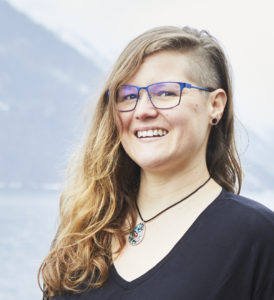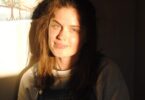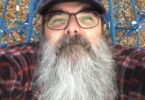1. They Say Fish Don’t Feel Pain
As a new intake, I’m ushered through a maze of clinical rooms, a noisy lunchroom and a bustling gym. Joanne, the program coordinator, shepherds me, waiting as I shuffle with my cane and pelvic brace. We end at a darkened room set apart from the rest of the clinic. She says I’m part of a special group and this room, the “Fish Bowl,” is ours. We are special. This rehab program is made just for us.
I step into the Fish Bowl and scan the room. Seven people welcome me. I take the closest seat to the door. I always like to have an escape route. The windows are darkened by shades, and the fluorescents that line the clinic ceilings are not in here. A burly man with a line of fresh stitches sliced across his shaved skull greets me excitedly. “Welcome!” He looks me up and down like he’s thirsty and I blink loudly. “You’ll get used to it,” he says. I can only nod. He takes that as an invitation and says, “So, in a nutshell, I found God after I was squished almost to death driving a truck for work. My girlfriend can’t stand me anymore.”
“Sorry,” I say, surprised by his candour.
I smell armpits and discount lunch meat. I want out, but I don’t think there is an out. I send an ESP message to my friend Mark to come back for me. He dropped me off last night, driving me hours from my mountain home. I can’t drive because my brain is on backorder. I’m stuck here, until these people tell me I can go.
This place that I will soon call Concussion Camp is in a large strip mall on a highway that cuts through a city forested with big box stores. I see right away this is a sad place to be stuck. In the room, I’m bombarded with questions that amount to what are you in for? A couple older women look at me with long, concerned eyes. Joy tells me she identifies first as a mom, then as head injured. Everything else has faded away over the two years since her accident. I say I’m a chef, although these words don’t feel true anymore. I don’t say I am queer, although it’s perhaps the one thing I’m still sure about.
Even James, who had his skull hammered back together, is looking at me pityingly. Then I notice that I’m doing it too. To Head-Crush James. To Mama Joy. We’re all scanning to see who has it worse. Apparently my empathy has survived my fall.
◊ ◊ ◊
A minor traumatic head injury is called a concussion. This involves varying degrees of harm to the brain—the “minor” means the damage isn’t permanent. But the brain can be very severely bruised, causing various impairments that can take a long time to heal. There is physical pain, indeed. And another kind of pain. Like your body is being held in the mouth of a mythical swamp creature that’s deciding whether to spit you out in shreds or swallow you whole. Some days it feels like a tonne of weight has dropped on your head and others like someone took a pair of electric beaters to your brains.
2. Ceci N’est Pas Une Pen
In Joanne’s office she tells me that my assessment will be two weeks and then they’ll say how many weeks or months I may be here. This sounds like a bullshit amount of time. I’m examined by a swath of professionals bearing clipboards. They test everything—cognition, memory function, muscle injuries, mental and behavioural health, vision, hearing, balance, psychoneurology. They ask me questions from “What is the circumference of the earth?” to “Can you touch your toes?”
I’m aggravated by one question posed by the occupational therapist. A deadpan, arrogant (insecure? afraid?) bearded hipster, he holds up a pen and asks, “What’s this?”
“A pen,” I say.
“Incorrect,” he says, pointing to the lip of the lid. I’m so frustrated I’m ready to throw the pen and the hipster off a cliff. My desire to smash something to bits and scream in someone’s face is my new normal. Back in the Fish Bowl, I rant to my fellow sufferers about the pen question. We bond because everyone was asked that. No one got it right. Mama Joy googles it. Apparently, it’s called a pen clip. We laugh and laugh because who the fuck knows that and Christ, isn’t there a better way to find out the state of someone’s bruised mind?
This is the first time I’ve laughed since I fell two months ago. For those months after, I hid in the darkened crevasse of my house. I lay in what felt like a coma for a number of days that I will never be able to tell you. I cried and yelled and slammed my favourite Fuck Patriarchy mug into microscopic matter. I walked hunched, immobilized by a pelvic injury and whiplash. And now, because I made no improvements, I’m here at rehab.
3. Camp is for Everybody!
It doesn’t take me long to realize there are many types of campers here. There is the angry concussed who paces around the joint, going outside for constant smoke breaks. There is the sad, weepy type who sits with heating pads on their back and neck. Mama Joy makes sure we all have our mats for stretch class and corrects us when we do the moves wrong. There is the silent type, heavy head in hands. We have things in common. We all flinch at the sound of a car horn in the street or a water bottle falling onto the gym floor. Or a baby crying in the lobby of the strip mall. Much to our chagrin, there is a children’s dentist upstairs, so wailing children being dragged towards the elevator is an everyday sound. We walk softly so our brains won’t bounce in our skulls.
During my first few days, every time I have an “episode,” they put me in a dark room with a meditation tape. The man on the recording says to let the breath reach the tips of my toes. But I can’t. My rib cage is a prison for my breath.
Many people say that concussions are impossible to fathom if you’ve never had one. Yet, every other person will have one at some point in their lives. Many concussions will be resolved within a couple days, some will disable for weeks, months, years. Some of you will never be the same.
If a concussion is indescribable, it’s probably better to try to paint it. Picture a canvas with thick smears of various greys and blacks. The artist uses a palette brush to add dollops of ultramarine blue. And the thinnest brush for a fine line of dioxazine purple. And then more black sponged on, blurring the colours. And when the painting is complete and looks like a swirling stormy sky, the artist drags fingernails through the sticky paint. Wet and clawed, it is complete.
In our daily lesson, they say that the brain is a muscle, it can heal like any other. I, like others in the head injury treatment program, grip the hard, cold truth of my previous life in a clenched fist, wondering if it’s gone for good. When is the exact moment, the best instant, to let your old life fall away?
There’s no sorrier bunch than a room full of head-injured patients. Any loud noise, bright light, the whole lot of us are ready to throw down. Everybody at Concussion Camp had their body thrown, crushed, banged, plummeted. Some almost died. Everybody was injured at work. For some, an inch the other way could have resulted in death, like in prime-time television psychodrama. We talk about our lives a lot. But deep shit that usually doesn’t pop into conversations until well into third pitchers of craft beer imbibed on beautifully hand-carved cedar bar stools. Or maybe that’s more about what I’ve missed in the months I’ve been under repair.
We sit on our dirty padded event chairs. Most of us have special blue glasses to protect us from light and to retrain our eyes to work properly. We tell each other that the thick blue glass looks good. We play that we are each still the self that was lost. How many ways are there to lose yourself?
◊ ◊ ◊
I’ve survived two weeks of investigation. The professionals sit around and discuss the finer points of my “case.” That means my body, my mind, the ways I’m broke. They don’t have boxes to check for my spirit, my grief, my displacement dislocation disorientation. I watch from a bench outside the glassed room. Does my body not deserve to be in this room?
Bearded Hipster will later let it slip that in this meeting they thought I might be beyond the scope of their outpatient program, so they discussed me long and hard. The scale tipped in the end, and they decided to keep me.
Watching them meet, I guess they want the thousands of dollars from workplace insurance. Or maybe they think my constant chatter is cute. They tell me I’ll be here for months, no doubt about that. I think of escape. I numb myself in the evenings by listening to Murdoch Mysteries on CBC described audio like someone who is old and blind. The old-timey predictability soothes me, and I’m sure I’m losing my edge.
4. Walk it Off, Baby
Every day starts with signing in. And then a group walk. Finally, I’m well enough to partake, with the aid of my brace and walking poles. The dry winter air whips me awake. How to possibly express the indignity of a staffed walk to an independent, active person? Joanne wears an emergency backpack and looks both ways for us, so we don’t have to. Another staff person brings up the rear.
But seriously, what could Joanne possibly have in her pack that could save us on our walks that rarely exceed five or six blocks? I think of kids in daycare, walking a roped line. When we’re small, we practice being unfree. That early training is coming in handy at Concussion Camp.
James calls our program “Brain Jail.” Our Fish Bowl keeps us separate from the generally injured population of the clinic. I’m almost jealous of their bones that will fuse back together.
There are many differing perspectives within the medical field about concussion treatment. At rehab they tell us that staying in the dark and avoiding noise and screens is old school and can exacerbate symptoms. Once you offer your brain a dark cave, it only wants that. But still, this is what most physicians indicate, hence my two months in my darkened house. You have to adjust your brain back to proper function, they tell us over and over. But this jostling is hard and rough. The lights in the central area (aka not the Fish Bowl) singe retinas. At times this jostling feels more like quaking.
Three days a week Joanne leads us through visualization exercises that she prints off from the internet. We lay on the floor on mats with pillows—again, like kids in daycare. One of the scenarios she reads way too often is about a beach and sand and beautiful water. I huff because, in the visualization, we always come across a crab. Picturing a crustacean doing a slow crawl past me on the sand does little to repair my damaged nervous system.
I ask the professionals a lot of questions about my nervous system because I can’t calm the fuck down. I scream at a pen dropping and my body shakes and twitches, my arms fly everywhere. And I couldn’t shut the fuck up if my life depended on it. My mind is glued to specific sentences, “Oh God!” “Okay! Okay! Okay!” I say all day ad nauseam.
Everyone in the Fish Bowl laughs and says, “I feel that way too, thank you for saying so.” You’re welcome. My pleasure. The doctor shrugs and prescribes me drugs to tame me. To cool my outbursts. Good thing we’re not back in the day or I’d be called hysterical and shipped off. Wait a second, I’m already shipped off.
My friend in class, Brian, who is close to 60 and was almost crushed to death on a factory line, pretends to lead visualization class one day when Joanne is running late. We lay in wait, eyes closed, and he details a beach scene for us except in his vision we are at a nude beach, and a seagull gets away with a tuft of pubic hair. That gets us going really good. Laughing on our mats. It hurts our heads but we don’t care for one moment. This is medicine. This connection with these people is drawing me back into my body. So slowly, but still.
The staff want to get me on an exercise bike but sitting hurts so bad and I need to break my dependency on my crutches and brace first. I hold on to them tight. My body no longer trusts the world. A dropped glass or barking dog turns me into a screaming, bumbling mess. I’m lost without the usual strength of my body. It doesn’t take long to get over my ego of being a fully functioning, independent person who cares for other people her whole life. Sobering. Or is it humbling? There is a tissue-paper-thin line between able-bodied and disable-bodied. Anyone can cross it at any time. I know this viscerally now. This feeling can’t be unknown.
In cognitive class, I’m harkened back to grade school. We add, subtract, do puzzles, and nudge our brains to remember how to do necessary tasks. One day we have to write a grocery list, in the order in which we would collect items in our cart. As a person who is super into food, I’m appalled. But the physiotherapist, Tiny Aria, likes my list. She says, “Great thinking to get the produce first!” I wonder why I’m here in this room.
We do exercises to correct our vision. Looking from one dot to another until nausea encroaches. Patricia, who is now my favourite, and I work for days on a jigsaw puzzle of white ladies on a porch shelling peas. It’s good for our eyeballs, they say. Patricia is sweet and soft spoken. She asks seriously if I’m going to seal the puzzle with glue and put it up on my wall. “No,” I laugh, “I don’t need a memento of rehab, especially not of a glossed over white lady settler scene.” Patricia blinks at me like I may have never had my marbles. Poor Patricia. She bonked her head cleaning offices, a job she’s had for fifteen years. She gets the spins so bad she can’t stand up.
We learn how to take care of the snake that is our spine. Because there is no concussion without whiplash. I start sitting erectly while everyone else slumps in their chairs. Sitting up gives me some of my dignity back. So does doing hours of gym exercises every day. Tiny Aria is impressed that I do all my exercises. Nothing like being immobilized for months to jumpstart a person to move. My body feels strange since my accident. Like the skin I’m sitting in isn’t mine. But I’m slowly getting stronger. I’m trying to become friends with my limitations. I’m sliding into this new version of myself. How do you greet a new self?
5. Undying Affection
I’m contending with layers of brain loss. I’m in a slightly different situation than others at Concussion Camp. If I wrote a love letter to my brain, it would go like this:
Dearest Brain,
Your gooey folds are so very cute. I may not have you forever. Having a head injury has made that more real than I could have imagined. And not just in the usual “none of us know how long we have” kind of way. But in how some mothers have different gifts for their children. Mine passed on tiny hands, ironclad determination, youthful skin, and a brain-death sentence crocheted into our genetic sequence. Maybe the universe is playing a sly game, giving me head injury symptoms that mirror a disease I have a fifty percent chance of getting in the future. Or, I’m being prepared for the imminent late stages of my mother’s disease.
Brain, for as long as I have you, I want to honour you. I want to use the shit out of you and treat you kindly and feed you things you love and give you quiet and rest. I am a writer. I am a writer. I am a writer. You are my gift in this life, Brainy. Thank you.
6. Amen!
Months spin by. I’ve lost track, living on rehab time. Sleeping in a bed that’s not mine, sitting in the dim Fish Bowl, eating my brain-healthy snack. People come and go from the program. There’s nobody in the room who is a white-collar worker. I think about how the bodies of working people are tossed and thrown, while their counterparts sit unharmed in climate-controlled offices. I could have had that. I spent a few years in those spaces. But my incessant need to move, the discomfort of polyblend office lady clothes on my queer body, as well as my obsession with culinary pleasures pushed me into kitchens, where my accident would eventually happen.
I forget I don’t believe in God, and pray that our medical system learns to handle complex cases with grace. Cases involving all the parts of a human. A human who is being. I cuss at the staff at rehab who patronize us under blaring lights while minimizing our suffering. They don’t mind my dirty mouth and my lack of volume control. They love me actually. Their jobs were so boring before they met me and my uncontrollable honesty. My verbal repetition. When I say “Oh God” for the thousandth time, James raises his hands and says, “Amen,” and I know he means it.
Every day I have a little more energy and can do a little more. My cognition is given the A-okay and my memory is strengthening, for which I’m grateful. So is my humour, which makes rehab feel like summer camp some days.
And there’s something else. Falling and crashing dislodged something within me. Anyone can ask me anything, I can only tell the truth. I’m flamboyant and theatrical, and I want to talk to every person I meet. Like I’m trying to make up for 36 years of anxious introversion. I forget that I ever held a single secret. I forget the promise to myself at 14 to seal my lips shut. What does it take to crack you open?
◊ ◊ ◊
Nearing the end of my time at rehab, I get everyone singing Amy Winehouse’s “Rehab” in the gym. It’s a hit. Before my head injury I would have needed ten beers to sing in front of people. But I’m a brain injury rehab comedian. The truth-saying class clown. I didn’t plan it that way, it just happened. Somehow, I feel alive, connected, even as I suffer. Because I have found my voice.
7. Epilogue
If someone had told me as I entered rehab that in two years I would still be healing from this, I would have crushed something. There’s been no more significant test of my patience than doing all the right things to care for myself, and then waiting. Waiting for healing, waiting for tests, waiting to see if doctors will actually see me.
I cannot know at this moment that after rehab I will take things into my own hands. I will be pricked by a thousand acupuncture needles, fly to Vancouver to have my skull adjusted, have my spine realigned by a craniosacral therapist, take Chinese herbs, go on a restrictive diet, partake in a year of somatic trauma healing, and do endless hours of vision therapy. This is practice in major life lessons, no big deal.
Now, there is a sweetness to the meaty Fish Bowl, the patronizing professionals, and the grime of strip-mall rehab. Because I’m fully living my own life for the first time. There’s no more lost time.
 Ari Lord’s fiction has been longlisted for the 2020 CBC Short Story Prize, 2022 Jacob Zilber Prize and nominated for the 2020 Sundress Press Best of Net Awards. Published in The Malahat Review, The Ex-Puritan, Plenitude, Foglifter, Minola, and elsewhere. They work as a freelance Writer & Editor and are a year-long Writer-in-Residence for an arts organization, Civic, in Nelson, BC (unceded Sinixt territory). They recently finished their first novel and are writing another, supported by the Canada and BC arts councils. They are passionate about queer literature and enjoy being outside with their dog and growing a large garden. @SLordAlmighty arilord.ca
Ari Lord’s fiction has been longlisted for the 2020 CBC Short Story Prize, 2022 Jacob Zilber Prize and nominated for the 2020 Sundress Press Best of Net Awards. Published in The Malahat Review, The Ex-Puritan, Plenitude, Foglifter, Minola, and elsewhere. They work as a freelance Writer & Editor and are a year-long Writer-in-Residence for an arts organization, Civic, in Nelson, BC (unceded Sinixt territory). They recently finished their first novel and are writing another, supported by the Canada and BC arts councils. They are passionate about queer literature and enjoy being outside with their dog and growing a large garden. @SLordAlmighty arilord.ca






